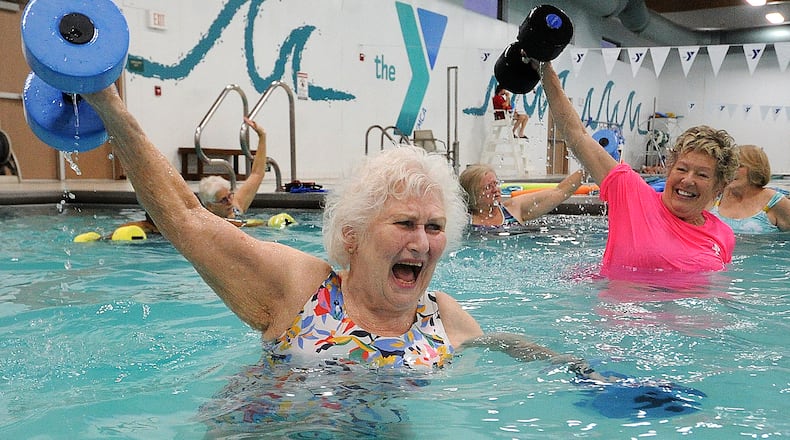“My doctors are amazed,” she said.
Specht is just one of many older adults who feel the benefits of aquatic fitness classes and therapy.
Aqua exercises can both treat current issues and ailments as well as help prevent new ones from starting, said Dr. Priyesh Mehta from the Dayton Outpatient Center, which offers physical therapy, pain management and other services at multiple locations throughout the Miami Valley.
“Water therapy is just one way to allow that exercise to happen without that stress on the joints,” Mehta said.
In addition to being easier on the joints, water exercise improves cardiovascular function and balance and can help to reduce falls, he said. The buoyancy can be a boon for people with arthritis, as well as those with muscle pain or fibromyalgia – conditions in which land-based exercises can cause worsening pain. The heated water can provide a therapeutic effect as well.
Aqua therapy also can be good for the lungs. Mehta has seen improvements in respiratory function, such as in patients with asthma.
Water exercises can benefit all ages and those at all fitness levels. The goal is to tailor a program based on individual patients and the appropriate exercises that they need, Mehta said.
Dayton Outpatient Center provides a holistic approach to pain care. For those who incorporate water therapy into their routine, the center offers a therapy pool and equipment such as weights that go in the water and treadmills that can be submerged.
Many people take a hybrid approach, combining their water exercises with, for example, 10 minutes of stretching on land, he said.
Patients also say they enjoy going to the pool and the camaraderie of group classes, and Mehta said that makes it easier for them to get their recommended 30 minutes of exercise at least 5 days each week. When they like the exercise, they are more likely to do it and therefore more likely to see natural benefits, he said.
“With any exercise, the therapeutic effect builds over time,” he said.
Aquatic fitness options are popular at the YMCA of Greater Dayton’s Kleptz branch, located in Englewood.
“Our water classes are packed,” said Amy Waltersheide, the senior membership director there.
The classes are free for YMCA members, and the branch offers 16 water classes every week in its therapy pool, heated to 92 degrees, she said. Another 12 classes are located in the main pool. Options are varied and include water aerobics, aqua Zumba, water walking and deep-water classes.
“You don’t have to swim at all,” said Waltersheide, and participants don’t need to go under water or even get their faces wet.
What they can do, she said, is get sore and even sweat underwater. Water enthusiasts can get just as good of a workout in the pool as they do on land.
Around 30 people a day attend a water class at Kleptz, spanning generations. She too sees that aqua classes in the warm water are an appealing option for those who have arthritis or joint issues.
“You don’t have the pressure of gravity,” Waltersheide said.
The branch also has chair lifts for both the therapy and main pools for those who are unable to use the stairs, she said. Aerobic equipment, water flotation belts and life jackets also are available, and a lifeguard is on duty at each pool.
Specht, who returned to the Miami Valley in 2017 after many years in Florida, was worried that she would fall and break a bone. Exercising in the water has allayed those concerns.
“If you fall down, you’re in the water,” she said.
Different water classes work out different parts of her body, such as the core, the arms and legs or even the fingers, she said, and the movements help improve participants’ range of motion.
Instructors expect them to work within their personal limits.
“They always say, ‘Do what you can with what you’ve got,’” she said.
Specht spends two or three hours in the pool every weekday. She looks forward to her visits and seeing the many friends she has made throughout the years.
“It’s not only good for your health and your body, it’s fun,” she said.
About the Author

